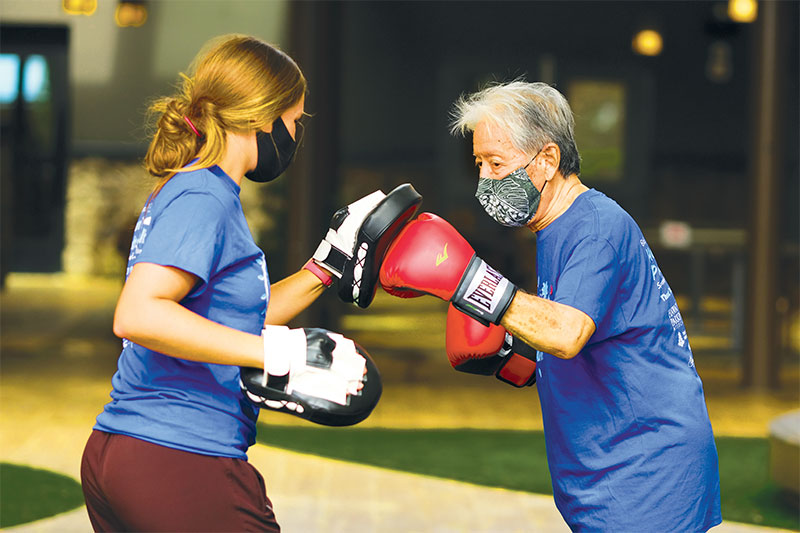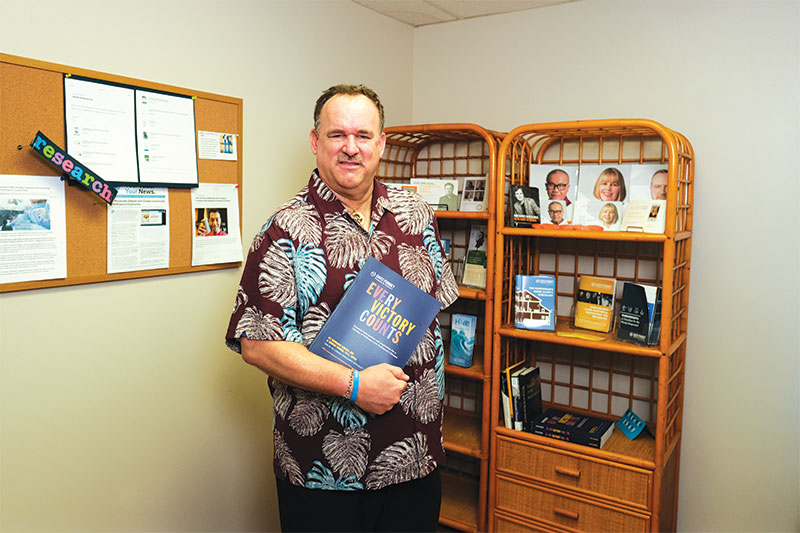The Everyday Hero

(From left) YMCA member Lena Matsumoto, YMCA instructor Kathy Lohman, patient Robert Frederick, personal trainer Glen Higa, Jerry Boster, patient Mike De Cero, exercise physiologist Amber Curtiss and patient Raymond Kurosu
Hawai‘i Parkinson Association president Jerry Boster continues to be an inspiration and help to those living with the dreaded nervous system condition. That includes himself.
Jerry Boster is not a household name like Michael J. Fox, Muhammad Ali, Linda Ronstadt or Pope John Paul II. But he does share something in common with all of these famous people.
He, too, has Parkinson’s.
Boster learned of his progressive neurodegenerative condition eight years ago while in the process of retiring as a U.S. Navy commander. The news, he says, hit him like a “gut punch.”

Exercise physiologist Amber Curtiss encourages patient Raymond Kurosu to keep his eyes ~ xed on the moving hand pads.
Admittedly, he disregarded the early signs of Parkinson’s, a condition that affects 1 million Americans and 8 million people worldwide.
“My wife, Janice, had seen the left-hand tremors and change in gait. She brought them to my attention, but I was in denial so I ignored her and the symptoms,” he remembers.
Fortunately, a family friend was finally able to talk him into seeing a neurologist. Doing so not only put him on the path to receiving the necessary treatment, but also placed him in a position to help others who live with the condition.
“By inclination and training, I’m a guy that makes things happen, so I started getting involved in the (Hawai‘i) Parkinson Association,” elaborates Boster.

In his time as president of Hawai‘i Parkinson Association, Jerry Boster has increased membership, support and more.
Initially, he formed a fundraising team for the association’s annual walk (see story at right). When those efforts went well, he was asked to join the organization’s board of directors in 2016. A year later, he was named its president and he’s served in that role ever since.
For Boster, addressing the needs of the whole person remains the association’s focus, and exercise for those affected by the disease is “a critical piece of their treatment.”
“I have a triangle that I use,” he explains. “One side of the triangle is medication, one side is exercise and the third side is wellness — which is diet and nutrition, mental stability, spirituality and all the other things that go into a person.”
As the leader of the nonprofit volunteer group, which comprises people living with the condition, caregivers, family members, health care professionals and business leaders, Boster is always looking for assistance in two primary ways — through volunteer work and donations.
“Supporting the patients and helping them live the best life they can is our No. 1 mission,” says the man who spends much of his time advocating nationally on policy issues in coordination with the Michael J. Fox Foundation for Parkinson’s research, as well as serving as an ambassador for the Parkinson’s Foundation, Davis Phinney Foundation and more.
Boster notes the local association conducts support groups, offers education and exercise sessions (which include boxing and cardio work), and pushes for ongoing research into a cure for Parkinson’s.
“We also started a couple more unusual things. We started up a choir. It’s been very successful,” he adds.
“Boxing for Parkinson’s is different from a regular boxing class at a gym. Many times, it is one-on-one with just the instructor and the person with Parkinson’s. The workout is all about building strength, dexterity and stamina, not actually boxing in the ring against somebody else,” he notes.
During his tenure as president, Boster has increased support, membership and more for the association. His efforts culminated with last year’s establishment of the Hawai‘i Parkinson’s Association Resource Center. Located at St. Francis Medical Center of Hawaiʻi in Liliha, the center offers free information for new and existing patients.
“I’ve been president for about four-and-a-half years, and the biggest thing we did in November of last year, was we opened up a brick-and-mortar resource center, a time right in the middle of COVID. It’s a place where people — especially the newly diagnosed — can come and get information. When you’re trying to accept a condition like Parkinson’s, or any other major medical condition, you’re struggling. And you don’t want to have to deal with trying to do all this stuff on your own,” Boster shares.
He remembers how difficult it was for him personally that there was no such information center available at the time of his diagnosis in 2013.
“The other thing we’re trying to do is expand the number of support groups that we have — talk-story, caregiver and exercise groups — to reach out to as many Parkinson’s patients as we can in Hawai‘i. There’s about 7,000 diagnosed patients and we estimate about 3,000 undiagnosed patients,” he explains.
When he was diagnosed as a Parkinson’s patient, he firmly decided to “make things happen” and joined the effort to find a cure for the condition, including participating in a drug trial.
Many drug treatment trials never get off the ground due to lack of volunteers, “which is one of the things that motivates me to volunteer for the trials,” Boster notes.
He calculates that the estimated economic burden to the state is around $52,000 per Parkinson’s patient, or $350 million total as of 2019.
Military veterans suffering traumatic brain injuries from explosives, along with the extensive use of insecticides and pesticides, have been linked with Parkinson’s symptoms, according to Boster.
“One in 8 Parkinson’s patients is a veteran like myself,” he shares.
Boster has worked at the U.S. Indo-Pacific Command as a federal civilian employee for the past seven years, and his current job is as an analyst there. October is National Disability Employment Awareness Month, and in 2018, Boster was selected for the Secretary of the Defense Award for Outstanding Civilians with Disabilities award. When giving presentations, Boster emphasizes the “able” in disable, and seeks to raise awareness about the condition.
Originally from Southern California, Boster has called the ‘Āhuimanu neighborhood in Windward O‘ahu home for the past 13 years.
Soon after moving to the islands, Boster joined a group of University of Hawai‘i football fans who made him and his wife feel like ‘ohana.
“We came here for the military, but we stayed because of the people and the ‘āina,” he notes. “We’ve become part of our community, and part of that is giving back.”
Tim Bowden first came to know Boster and his wife over a decade ago at a football tailgate party for the UH Warriors.
“The New Oxford American Dictionary defines a hero as ʻa person who is admired or idealized for courage, outstanding achievements, or noble qualities,’” emphasizes Bowden.
“Jerry Boster epitomizes that definition every day of his life.”
EXERCISING FOR PARKINSON’S
Rather than hold a public walk at Magic Island in Honolulu like it’s done in previous years, Hawai‘i Parkinson Association’s annual Exercise Day will be held virtually in 2021 and comprise a series of short interactive exercise classes.
The event is set for 9 a.m.-noon on Sunday, Nov. 14.
“The classes will only be 5-7 minutes each,” says Hawai‘i Parkinson Association president Jerry Boster. “The idea is to give people a feel for what that type of exercise is like but not tire them out since we are planning for 12 segments. We’re planning segments across the exercise spectrum from the heavy cardio like boxing to the light, targeted exercises like singing and drumming.”
Each segment will have an instructor, including American Ninja Warrior contestant Jimmy Choi, who also has Parkinson’s.
Boster is hoping to attract “about 200 people” to this year’s event.
“This is also our big annual fundraiser,” he says. “Our goal is $50,000, the same as last year when we raised $54,000. We are off to a decent start and have raised about $25,000 so far.
“One of the good things about donations is it all stays here in Hawai‘i,” he adds. “We’re an all-volunteer board. None of us gets paid.”
The public can register for the Nov. 14 event and donate by visiting go.rallyup.com/hpawalk2021 and donations can also be made online at parkinsonshawaii.org.





